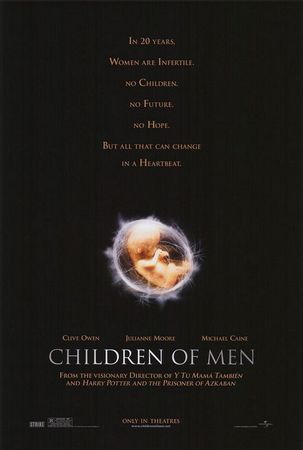 Children of Men |
The year’s best film won a scant three Academy Award nominations for Best Cinematography, Film Editing, and Adapted Screenplay. It did not win any of these, and that is a shame. Despite overwhelmingly positive reviews from critics, the film was completely ignored at the box office, only bringing in a scant $34 million domestically.
It’s the year 2027, and the world’s youngest person has just been murdered. He was nearing the age of 20 in a world where women have been infertile for two decades. A small crowd of weary faces absorb the news in run down coffee shop. What happens next is both shocking and predictable, introducing us to a world where all countries have descended into anarchy except Britain, which has maintained the illusion of order by imposing a police state. Billboards bearing messages of paranoia, terrorist bombings, angry mobs, cages filled with illegal immigrants, and a product called “Queitus” for citizens wishing to “Choose” their time to die fill this hopeless decaying setting.
In this world, Theo Faron (Clive Owen), a bureaucrat, is approached by members of the Fishes, an underground resistance movement. They want him to use his connections to ferry Kee (Claire-Hope Ashitey) out of the country. Kee is miraculously pregnant and the Fishes, led by Theo’s ex-wife Julian (Julianne Moore), are attempting to deliver her to the Human Project, an organization of scientists rumored to be working on the future of the human race.
The government claims the Fishes are behind the terrorist bombings, the Fishes claim the government is behind them; however, as we learn, no one is as they claim, and the film wisely chooses not to explain the realities of these conflicts. Instead it uses the randomness of the violent mobs and bombings to convey the fear and confusion of a world falling into anarchy. The terrors are abstract, making them all the more effective and making us wonder if the Human Project even exists.
There are many subtle themes running throughout the story. Theo regularly attempts to light up a cigarette, but never succeeds. Animals take a liking to him, as if they can see into his honorable nature. Then there is the string of chance that places Kee in Theo’s care; although, there are no deux ex machina cop-outs in the film, there is this incredible sense of higher-powers at work. The synchronicities alternate between aiding and imperiling the protagonists, and we may assume they are secular in nature from the wide variety of unrecognizable religious denominations that exist in this future. The director does a superb job of keeping the audience guessing, “Is this providence?”
Alfonso Cuaron’s previous directing credits include such diverse films as the mainstream Harry Potter and the Prisoner of Azkaban and the independent Y Tu Mama Tambien. His choices of filters and hand-held camera shots provide the raw, grungy feeling that help to make the film’s world all the more convincing. He orchestrates several edge-of-your-seat moments such as a chaotic ambush scene, a suspenseful chase in a stalled car, and battle siege reminiscent of the war scenes from Saving Private Ryan.
Clive Owen is an actor of great diversity, and here he plays an unlikely hero in Theo. Opposite him is Claire-Hope Ashitey as Kee, an equally unlikely candidate for mother of the human race. Michael Caine provides a wonderful performance as Jasper Palmer, Theo’s father, a pot-smoking (and growing) freethinker, and a litany of other peripheral characters all stand out in their own ways so that we know them all and remember how they fit into the complex scheme of things.
The film is science fiction and distopian, but, most importantly, the film is a commentary on our present circumstances. So much of the film’s imagery and themes, terrorism, anarchism, detention camps, and illegal immigration, match the imagery we find in our present news media, provoking us to think about our disturbing modern events and reinforcing our suspension of disbelief with real-world experience.
Children of Men is a film that stays with the viewer, haunting them for days with its powerful storytelling. For days I kept returning to the film’s climax. Weeks later I found myself thinking about the curse of notoriety foisted upon the world’s new youngest person, and what that would be like. Like all great science fiction, the film begs us to speculate and stirs our social conscience.
Perhaps the talent appearing in this film will receive its recognition at future Oscar ceremonies, similar to the way Stephen Spielberg has received numerous nominations for lesser films after the Academy snubbed him for his work on The Color Purple, and how Martin Scorsese took home this year’s Oscars for his film The Departed, after being overlooked for his superior work in films like Raging Bull and Taxi Driver. Either way, I’ll be keeping an eye out for Cuaron’s future works.